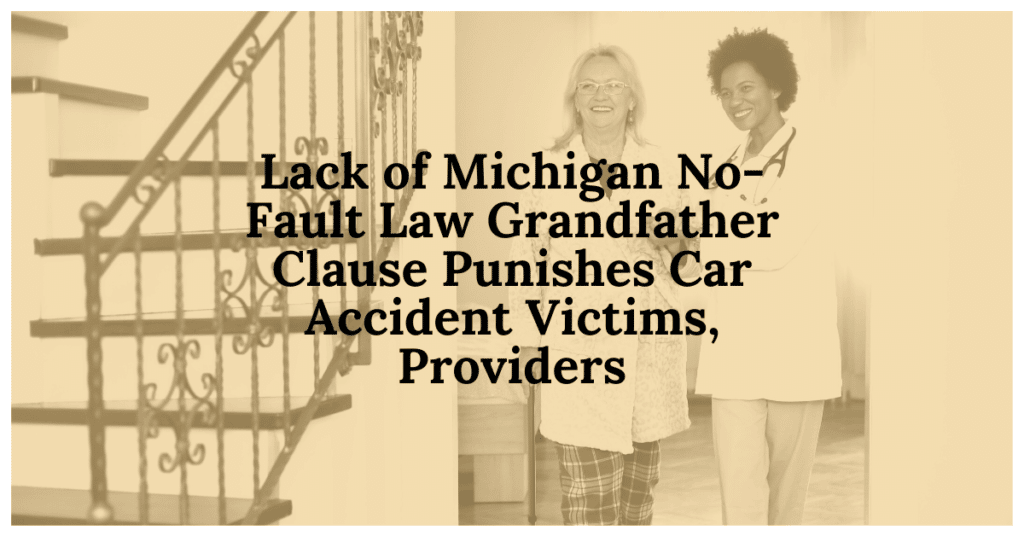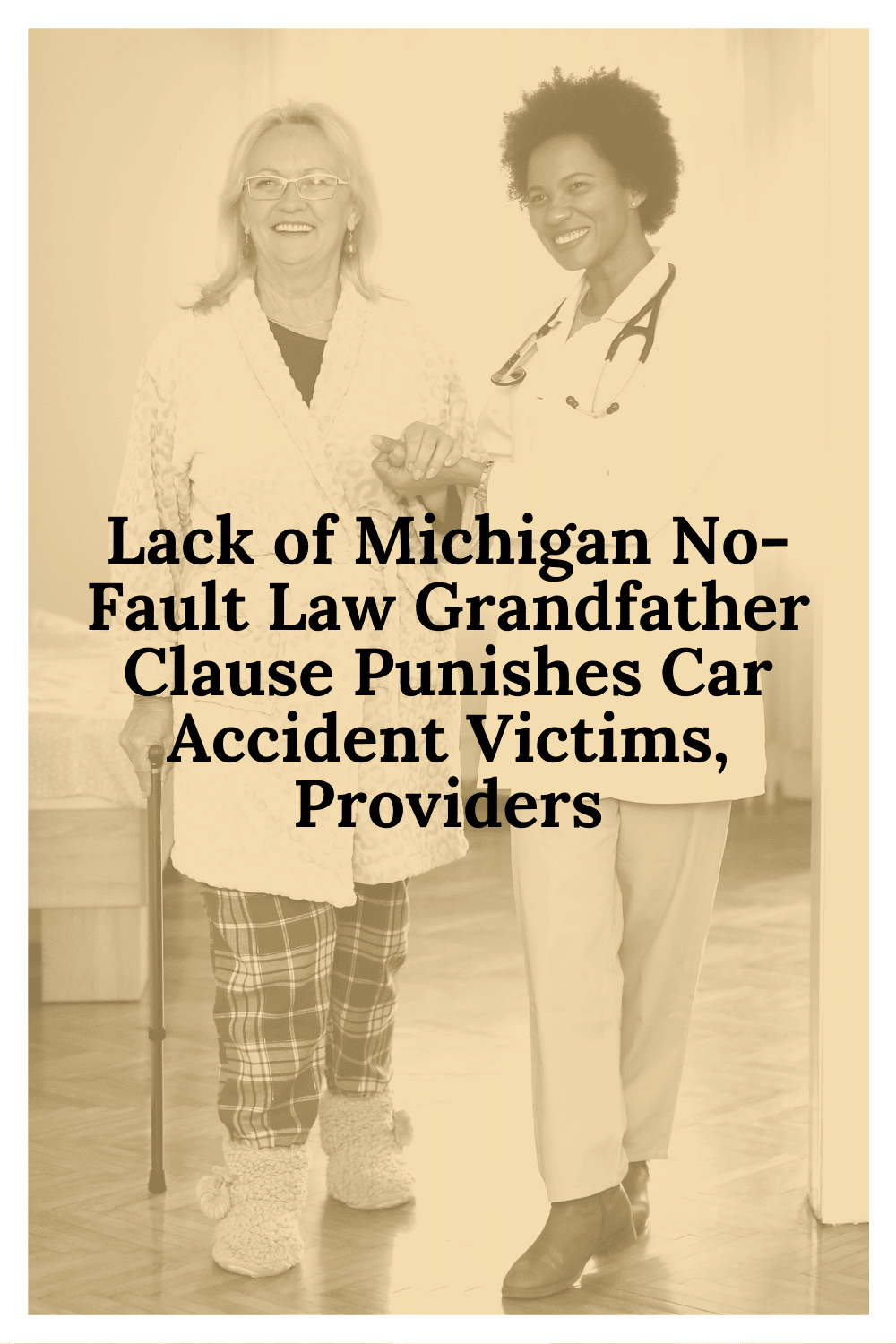
The lack of a Michigan No-Fault Law grandfather clause punishes car accident victims and medical providers by leaving them subject to restrictions they never agreed to such as coverage limitations and a medical fee schedule whose reductions on reimbursement rates will deny them access to necessary medical care and treatment.
Even though it is not generally permitted under the law and even though it takes away the rights and benefits that car accident victims paid for years ago, Michigan auto insurance companies are trying to apply the changes that were passed in 2019 to claims that had already been filed.
It is not fair that insurance companies are doing this. Statutory amendments are generally “presumed to apply prospectively” to the future, not retroactively to things that happened in the past, because “retroactive application of legislation ‘presents problems of unfairness because it can deprive citizens of legitimate expectations and upset settled transactions.’” (Johnson v. Pastoriza, Michigan Supreme Court, June 5, 2012, #142127; LaFontaine v. Chrysler, Michigan Supreme Court, June 10, 2014, #146722)
But auto insurers are getting away with it because lawmakers failed or neglected to insert a Michigan No-Fault law grandfather clause into the bill they hurried through the Legislature in 2019 that would have specifically protected the rights of car accident victims who were injured before reform was passed.
A recent Michigan Supreme Court case that addressed whether and when amendments to a law can be applied to events that happened before the amendment – especially when the new Michigan No-Fault law does not contain a specific grandfather clause – may help to protect victims’ and providers’ rights and to ensure that victims get the medical treatment and care they need.
To learn more, please check out our video:
Ruling highlights need for a Michigan No-Fault Law grandfather clause
The Michigan Supreme Court’s recent ruling in Buhl v. City of Oak Park (MSC, June 9, 2021, #160355) could provide much-needed protection to car accident victims and medical providers that would have been available if lawmakers had included a Michigan No-Fault law grandfather clause in the legislation that hastily passed in 2019.
In Buhl, the Court held that a statutory amendment could not be applied retroactively to events that occurred before the amendment – but could “only be applied to causes of action that accrued after the effective date of the amendment” because:
- There was “nothing in the plain language of the statute suggests that [it] was intended to apply retroactively. To the contrary, the amendment was given immediate effect without further elaboration. Furthermore, the amendment makes no mention of whether it applies to a cause of action that had already accrued before its effective date.”
- “[R]etroactive application would relieve defendant of the legal duty it owed to plaintiff at the time the injury occurred. In other words, because plaintiff’s claim had already accrued on the day she was injured, the retroactive application of [the amended statute] would effectively rewrite history as to the duty defendant owed plaintiff by absolving defendant of its duty . . .” The Court went to explain that a statutory amendment cannot be applied retroactively if it will “impair vested rights acquired under existing laws or [it will] create new obligations or duties [or attach new disabilities] with respect to transactions or considerations already past.”
- A “newly enacted statute or amendment should not be retroactively applied if doing so would relieve a party of a substantive duty” and “retroactive application here would relieve defendant of the duty it owed . . .”
In the absence of a Michigan No-Fault law grandfather clause, those points apply with equal force to the changes brought about by the reform law that was passed in 2019 especially the fee schedule and the 56-hours-per-week coverage limitation for in-home, family-provided attendant care:
- There is nothing in the reform law suggesting it was intended to apply retroactively to victims’ cases that existed before reform and/or to victim’s pre-existing, pre-reform auto insurance contracts. There was no explicit mention of the reform law being applied “retroactively” or that it was intended to apply to accidents that occurred prior to the date that reform was enacted. There was also no statement in the reform law that it applied to agreements/insurance policies that were already in existence when the reform law took effect.
- If it was applied retroactively to victims whose cases arose before reform was passed (based on agreement/insurance policies that were in existence when the reform law took effect), The reform law would relieve or absolve auto insurance companies of the substantive duty they had had since the victims’ accident to pay benefits. To put it another way, retroactive reform would impair the victims’ vested rights to receive unlimited medical costs and to not be subject to a statutorily prescribed reform medical fee schedule that restricted reimbursement rates to medical providers.
Is there a Michigan No-Fault Law grandfather clause?
No. There is not a Michigan No-Fault Law grandfather clause for the new law. Auto insurers are taking advantage of the lack of a clause by using the reform’s coverage restrictions and its arbitrary medical fee schedule to increase profits by slashing payouts.
How does lack of a Michigan No-Fault law grandfather clause hurt victims and medical providers?
The lack of a Michigan No-Fault law grandfather clause hurts car accident victims and medical care providers by taking away coverage and benefits they have had a legal right to since the time of their pre-No-Fault-reform car accident.
The following hypothetical illustrates how devastating the lack of a Michigan No-Fault law grandfather clause can be for victims.
Prior to the reform law that was passed in 2019, suppose that a catastrophically injured car accident victim was receiving doctor-prescribed 24/7 attendant care (168 hours per week), provided in-home by her husband. He was paid $12.25 per hour (only slightly more than the Bureau of Labor statistics rate) which came out to $294 per day.
Under the reform law, the fee schedule that takes effect on July 1, 2021, will slash the husband’s attendant care hourly rates by 45% to $6.74 per hour.
On top of that, the victim’s husband would only be entitled to compensation for 8 hours per day because under the reform law auto insurance companies are only required to pay for 56 hours per week of in-home, family-provided attendant care. That comes out to just $53.92 per day – down $240.08 per day from pre-No-Fault reform.
The resulting scenarios include one or more of the following with the lack of a Michigan No-Fault Law grandfather clause:
- The victim and her husband suffer financial ruin because he no longer works outside the home and because insurance will no longer pay him adequately or fully for the attendant care he provides to his wife.
- A commercial nursing agency may be needed to provide the remaining 111 hours per week of doctor-prescribed attendant care. The feasibility of this option is uncertain considering that once the fee schedule takes effect July 1st many home health care agencies will no longer be providing in-home, attendant care. Additionally, given how low the reimbursement rates are being driven down under the fee schedule, it is likely that the quality of whatever attendant care is available will be lower than what is necessary – and what was available before the reform fee schedule.
- The victim may be forced to leave her home and enter a residential care facility (if any continue to operate once the fee schedule takes effect on July 1, 2021) if arrangements cannot be made to ensure that she is able to receive in her home the 24/7 attendant care that was prescribed by her doctor.
Have a question? Call the car accident attorneys at Michigan Auto Law
If you have been seriously injured in a car crash and have questions about how the No-Fault reform can reduce your care and treatment options, you can call toll free anytime 24/7 at (800) 968-1001 for a free consultation with one of our experienced auto accident attorneys. You can also get help from an experienced accident attorney by visiting our contact page or you can use the chat feature on our website.



